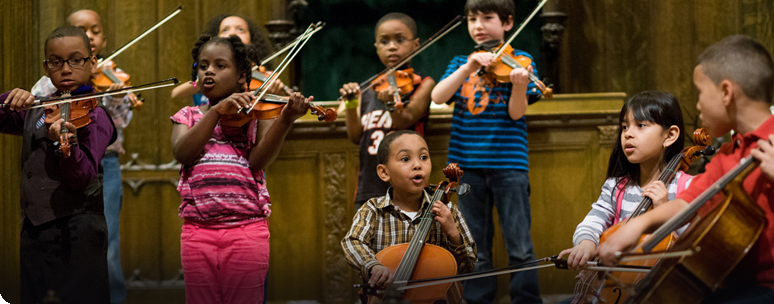Maxine Greene has died. My interactions with her set me on the course I am on, and the career I have had.
In 1995 I heard Maxine speak at the Coalition of Essential Schools Fall Forum, and her fresh approach to articulating the intersection of arts, education, and social change provided a huge opening in my thinking. Releasing the Imagination was published that year, and it became a bible for me in my academic work, and in forming ideas for what became Community MusicWorks.
Maxine was an embodiment of the living philosopher—her ideas weren’t static, but lived, examined, reviewed, discussed. And, unlike some brilliant thinkers, Maxine was truly present and human—not lost in ideas only. It was the latter quality, the familiar Jewish Brooklynite that led me to introduce her to my grandmother over dinner at “Busby’s” in Maxine’s neighborhood—two women, born in the ‘teens, who embodied the culture from which they came, but also transcended the times. Both boldly moved through gender barriers and became women leaders—in Maxine’s case by breaking into the world of professional academic philosophers, and in Grandma’s case by moving to Manhattan and living the last chapter of her life as a city girl, working, going to school, taking in the cultural life and more. (For years afterward, Maxine would try to remember how we had first met…”was it your grandmother who introduced us?” she would ask.)
What an honor when Maxine accepted my invitation to come to Providence to speak at a conference we held here, whose purpose was to further build the community of artists and educators who were applying her ideas, albeit with baby steps by that point, in 2000. Then again, in 2008, when I could proudly tell Maxine that we had built the “community of educators committed to emancipatory pedagogy, particularly in the domain of the arts.” (from “Texts and Margins,” in Releasing the Imagination.)
And then there was Maxine’s living room, the venue for so many magical discussions, visits, and salons, including one in which our quartet performed. Maxine would describe for years after, the transformation she felt, looking at the trees in the park across Fifth Avenue from apartment 3C, as they had never appeared before—how the music transformed even her view of daily life. How many people, devotees, students, august leaders, sat in that living room?
I remember talking with Maxine on many occasions about Paolo Freire, whose work is another bedrock inspiration for CMW and countless other educational initiatives. “Yes, I loved Paolo. I remember the birthday party I threw for him…” For Maxine it was like that. Friendship, love, humility—never aware of her own stature as among the pantheon of gods who inspire us.
It’s always an unfinished conversation. She taught us that. It’s a community in the making, a process of always becoming, never arriving. It’s never static, and we should fear someone who says it is.
It’s that quality that makes her death devastating. Of course, at 96, we can say it was a full life, well lived. But, I have never felt finished as her student. The world is emptier without being able to stop by and ask what she thinks of the latest news, the newest angle on the problems of education, of arts, of encouraging young people to imagine.
Thank you, Maxine, for a lifetime of inspiration. We’ll carry on for you, and in that honor you, with great love.
– Sebastian Ruth
Read the transcript of Maxine Greene's 2008 talk at the Imagining Art + Social Change conference here.
Watch the video of Sebastian's interview of Maxine Greene for the 2011 Music & Civil Society symposium here.
